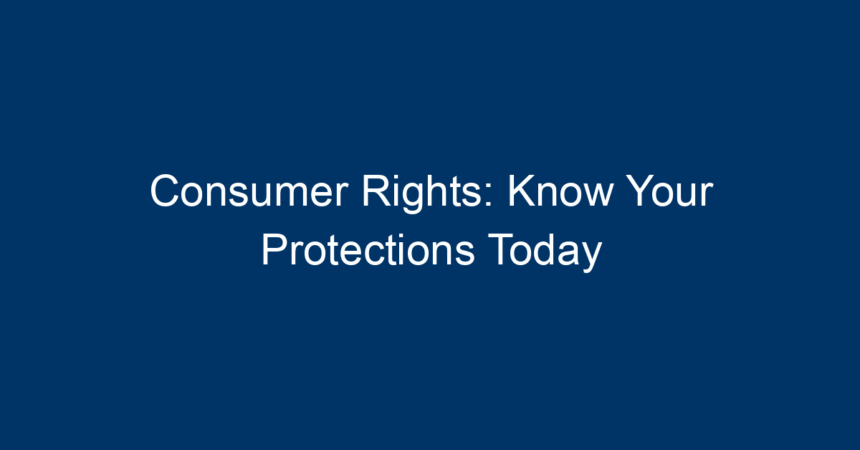In our increasingly commercialized world, understanding your consumer rights is more essential than ever. Whether you’re purchasing a small gadget or making a significant investment in a car or home, knowing your protections can empower you to make informed decisions. From unfair trade practices to faulty products, consumers are often faced with situations that require knowledge of their rights. This article aims to illuminate the importance of consumer rights and provide you with the necessary information to navigate the marketplace confidently.
What Are Consumer Rights?
Consumer rights are a set of laws and regulations designed to protect buyers from misleading practices and ensure fair treatment when purchasing goods and services. They vary by country but generally include rights related to:
- Safety and Quality: Products should meet safety standards and be of acceptable quality.
- Transparency: Sellers must provide clear information about the goods or services they offer.
- Fair Treatment: Consumers should not face discrimination or wrongful harassment while engaging in transactions.
- Redress: Consumers have the right to seek remedies for defects or unfair practices.
Understanding these principles can drastically improve your shopping experience and prevent problems down the line.
Why Are Consumer Rights Important?
Knowing your consumer rights helps you feel confident and secure while making purchases. Here are some compelling reasons why these rights are significant:
1. Protection Against Fraud
Fraudulent activities can happen to anyone. Consumers need to recognize that they have recourse if they find themselves at the end of a scam. For instance, if you purchase a product that lacks the advertised features or is entirely different from what was promised, your rights can protect you from being financially victimized.
2. Improved Market Standards
Understanding consumer rights creates a ripple effect in the market. When consumers demand high quality and ethical practices, businesses are incentivized to improve their offerings. This ultimately leads to a better marketplace for everyone.
3. Empowerment in Decision-Making
When you know your rights, you become a more empowered consumer. You are positioned to ask the right questions, make informed choices, and refuse unfair deals. This empathy and competence are crucial, especially in today’s fast-paced consumer world.
Key Consumer Rights Explained
To empower you further, let’s delve into some fundamental consumer rights that every buyer should understand.
Right to Safety
This right assures consumers that products will not endanger their health or safety. Manufacturers and retailers are obligated to ensure that their products are free from defects and are safe for intended use. If you encounter a defective product:
- Report it to the relevant authorities.
- Seek refunds or replacements from the seller.
Right to Information
As a consumer, you have the right to receive accurate and comprehensive information about the products you purchase. This includes:
- Clear labeling of ingredients, features, and pricing.
- Disclosure of terms and conditions before finalizing purchases.
If a company misleads you about any of these elements, you have grounds to file a complaint.
Right to Choose
Consumers have the right to select from various options without undue pressure. Sellers should provide choices, allowing you to select the one that best meets your needs. This right ensures competition in the marketplace, ultimately benefiting consumers.
Right to Representation
Your input as a consumer matters. Various consumer advocacy organizations exist to uphold your interests. Engaging with these organizations can empower you and influence market changes. Never hesitate to raise concerns or feedback regarding products or services you use.
Right to Redress
If something goes wrong with a transaction – such as receiving a faulty product – you have the right to seek rectification. This could involve refunds, repairs, or replacements. Familiarizing yourself with a seller’s return policy can empower you to take action promptly if issues arise.
Consumer Protections Across Different Jurisdictions
It’s essential to recognize that consumer rights can vary significantly based on local laws and regulations. Here’s a brief overview of consumer protections in different regions.
United States
In the U.S., consumer rights are protected by a variety of federal and state laws, including:
- The Federal Trade Commission (FTC) Act, which protects against unfair or deceptive acts.
- The Fair Debt Collection Practices Act, which regulates how debt collectors can operate.
Each state typically has its own consumer protection laws, adding another layer of rights.
European Union
In the EU, extensive consumer protections are embedded in law, ensuring that:
- Products meet strict safety standards.
- Consumers have the right to cancel online purchases within a given timeframe.
The EU framework aims to ensure a high level of consumer protection across member states.
Australia
Australia’s Australian Consumer Law (ACL) provides that products must be of acceptable quality and fit for purpose. Consumers can seek compensation for any loss they suffer as a result of a breach of consumer rights.
How to Assert Your Consumer Rights
Knowing your rights is one thing, but asserting them effectively is another. Here’s how to do it:
1. Document Everything
Always keep receipts and document all interactions when making a purchase. This evidence can significantly help if you need to escalate an issue.
2. Know the Policies
Familiarize yourself with the return and warranty policies of the companies you frequent. Many issues can be resolved directly with the retailer if you understand their policies.
3. Communicate Clearly
If you have an issue with a product, contact the seller or manufacturer directly. Clearly outline your problem and what resolution you seek. Be polite but assertive.
4. File Complaints
If the issue is not resolved to your satisfaction, don’t hesitate to escalate the matter. You can file complaints with:
- Consumer protection agencies
- Better Business Bureau
- Social media platforms to highlight your issues publicly
5. Educate Others
Share your experiences and knowledge about consumer rights with friends and family. An informed community plays a crucial role in demanding better market practices.
Conclusion: Take Charge of Your Consumer Rights Today
Understanding your consumer rights is not just about protecting yourself; it’s about contributing to a fair marketplace. By educating yourself about your rights and how to assert them, you become an empowered consumer ready to navigate today’s complexities with confidence.
Remember, knowledge is power. So take actionable steps today—learn, document, and advocate for your rights. Empower yourself and others, and help create a fair market for everyone. Whether you’re shopping for groceries or making a significant purchase, knowing your rights can make all the difference. Stay informed, stay assertive, and rest assured that you have rights that protect you.




